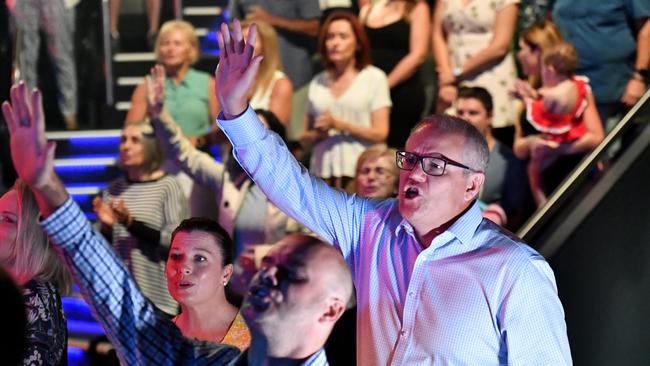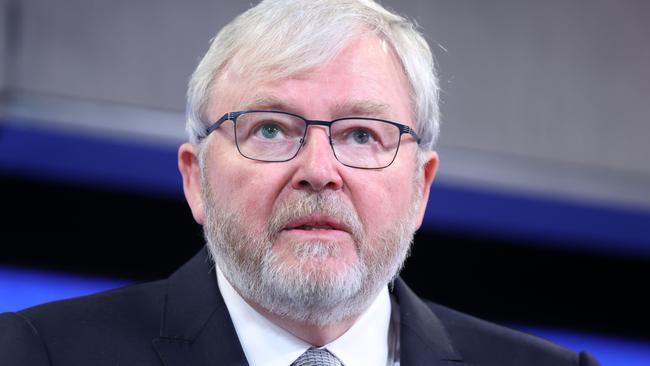Morrison has never breached division of church and state
Despite the fact that Scott Morrison has been PM for nearly three years, Kevin Rudd can’t provide one example of how he’s endangered democracy.

Kelly asked Albanese “about the Prime Minister’s faith” which she said was “again a matter of public discourse”. To which the Opposition Leader responded that, for him, “faith is a personal matter”. He added that while he respected “people’s own spiritual beliefs … it’s also important that we have a separation of church and state”.
Certainly, Albanese was conscious of the need to be cautious in this area, lest he offend people of faith. But there was no need to point to the need for a separation of church and state — between, in the old saying, that which pertains to God and that which pertains to Caesar — because this understanding has not been breached since the creation of the Commonwealth of Australia in January 1901.
By and large, Labor’s leading identities responded moderately, if at all, to the Prime Minister’s talk. Most criticism, along with some secularist sneering, could be found in such left-wing publications as The Guardian Australia, The Saturday Paper and the Crikey newsletter, plus some Nine newspapers.
The most sustained attack came from former Labor prime minister Kevin Rudd (writing in The Guardian) and former Liberal Party leader John Hewson (in The Sydney Morning Herald).

A reading of Morrison’s talk to the ACC reveals that the Prime Minister said nothing to blur the distinction between religion and politics. In fact, the speech was all but bereft of political comment.
The most quoted source was the late rabbi Jonathan Sacks. There were references to such Old Testament figures as David and Joshua, along with citations from the Psalms and the Book of Chronicles.
The Prime Minister proclaimed his faith in God, expressed a commitment to the covenant — which he depicted as the essence of community — and condemned “the evil one”. By which he meant, the Devil.
The existence of the Devil can be debated but few would maintain that this world is devoid of evil. And, yes, Morrison said, not for the first time, that he believes in miracles. Since this is a statement of belief, and not achievement, it’s a harmless comment.
It was the same with the Prime Minister’s address to the United Israel Appeal in Sydney on April 29. Once again, he quoted from Sacks and, on this occasion, gave Jacob a mention.
There were also references to former US president Teddy Roosevelt along with such Jewish Australians as John Monash, Isaac Isaacs, Zelman and Anna Cowen plus Judy Cassab and Isi Leibler.
Morrison spoke of his connections with “faith and religious communities across Australia”. In particular, “Christians from all denominations, the Eastern Orthodox faiths, Maronites, Catholics, Anglicans” along with “Judaism, Hinduism, Muslims”.
Certainly, Morrison said that “freedom rests on us taking personal responsibility for how we treat each other, based on our respect for, and appreciation of, human dignity. And he took a stand against what has come to be called identity politics.
In what became the most controversial part of the UIA address, the Prime Minister told his audience: “You are more than your gender, you are more than your race, you are more than your sexuality, you are more than your ethnicity and you are more than your religion, your language group, your age.”
A controversial contribution to the current debate, sure. But the Morrison view on identity will find considerable support among conservatives and social democrats alike. In other words, there was little that was political in the Prime Minister’s addresses to the ACC or the UIA.
But the reaction was fierce. Hewson maintained that Morrison’s emphasis on “his faith, the value of prayer, miracles and how God has led him to the office of the prime minister” was not to be mocked. But Hewson then alleged that “God cannot be used as an excuse for inactivity on key issues”. He did not provide evidence that Morrison has ever indicated otherwise.
And then there was Rudd. In his Guardian article, the former prime minister attacked Morrison’s commitment to the Pentecostal faith — which he depicted as holding that “if you are godly, then you will be both healthy and wealthy”. A grievous overstatement. But from this Rudd argued that “these Pentecostal tenets can present problems for our secular democracy”.
However, despite the fact that Morrison has been prime minister for close to three years, Rudd could not provide one example of how Morrison has endangered Australian democracy.
What was absent from Morrison’s recent addresses to the ACC and the UIA was any direction about what policies believers should hold or what political parties or movements they should support.
In his critique of the Prime Minister’s address, Rudd drew attention to his own essay “Faith in Politics” which was published in the left-wing journal The Monthly in October 2006. In this essay, Rudd did address matters of policy with respect to his faith — covering such issues as climate change, global poverty and asylum seekers. Also he condemned, from a religious perspective, what he termed “market fundamentalism”.
In his ACC and UIA speeches, Morrison did not mention Albanese or the Labor Party. In his The Monthly essay, Rudd railed against the (then) Coalition government in general and the (then) prime minister John Howard in particular for not following what he claimed were Christian tenets.
Rudd wrote in The Guardian that, before becoming prime minister, he had outlined his position on the role that Christian belief should play within secular society in The Monthly.
He wants Morrison to do likewise. But Morrison’s recent speeches have been on faith, not politics. Whereas Rudd’s Monthly article was about how his political positions were influenced by his faith. Even so, when in office Rudd did not breach the division between religion and politics. Nor has Morrison.
Gerard Henderson is executive director of the Sydney Institute. His Media Watch Dog blog can be found at www.theaustralian.com.au




Opposition leader Anthony Albanese was interviewed by ABC Radio National presenter Fran Kelly on April 27 in the wake of Prime Minister Scott Morrison’s address to the Australian Christian Churches national conference on the Gold Coast a week earlier. The speech was not released by the Prime Minister’s office but a video of the event found its way to a member of the Rationalist Society.